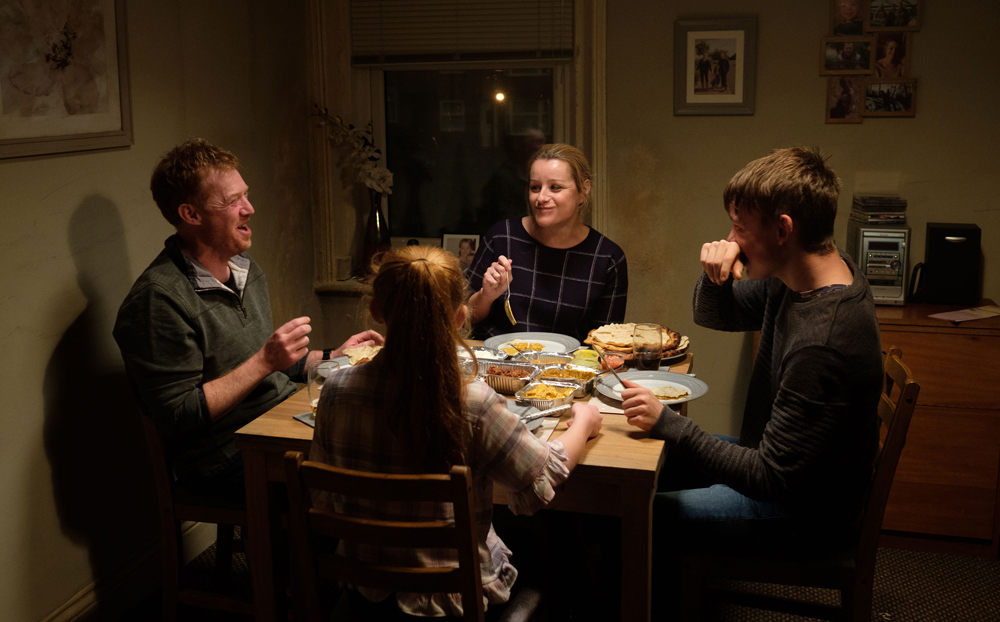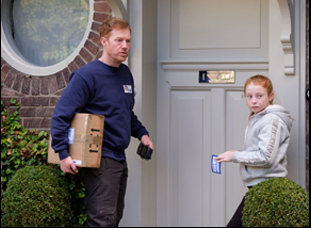It’s against Ricky Turner’s better judgment to take on a new route as a delivery driver for PDF in Ken Loach’s latest drama “Sorry We Missed You,” seeing the previous driver nearly come to blows with their supervisor Moloney (Ross Brewster) and others decline to take his place, despite the promise of “more money, more precisors.” Ricky (Kris Hitchen) hasn’t been on the job long enough to know better, taking the gig behind the wheel when it seems like he’ll be able to work for himself after too many other employers have let him down, but he could hardly know that when he goes to work for the speedy delivery service with the vague promise of making his own schedule, it creates the opportunity to be on call at all hours, requiring him to find a replacement in the event of any personal issue and the creeping feeling that there’s always more work to do. Ricky isn’t the only one in his household in this predicament, with his wife Abbie (Debbie Honeywood) on what’s known in the UK as a zero-hour contract as a caretaker where one is paid by the visit rather than any blanket compensation, and it’s left little time for either to spend at home with their kids Liza (Katie Proctor) and Seb (Rhys Stone) when the two have gone deeply into debt for the house itself.
While Loach and his longtime screenwriter Paul Laverty, show how much the two make others’ lives easier by traveling to their homes, offering convenience for the low price paid to a large-scale service provider, they illustrate precisely just how much it’s cost Ricky and Abbie as they struggle to hold onto both steady employment and their increasingly fragile family as all of the burdens once associated with labor have shifted from employers to the employees and the technology that has improved efficiency for getting the job done has eliminated any compassion for the people who still do the work. Thankfully, Loach and Laverty have enough empathy to go around in their 16th collaboration, a partnership first forged when Laverty wrote a script for what would become 1996’s “Carla’s Song” inspired by his experience living through the Nicaraguan Civil War in 1986 and cold-called filmmakers until Loach invited him over for tea, and together, they have turned the camera towards those who have fallen through the cracks whether it was the Irish freedom fighters of “The Wind That Shakes the Barley,” the carpenter whose welfare benefits are denied in the wake of a debilitating heart attack in “I, Daniel Blake” or even the postal worker who comes to see soccer star Eric Cantona after his life falls into shambles in the lighthearted “Looking for Eric.”
Although “Sorry We Missed You” can be quite devastating, Loach and Laverty remain great beacons for humanity on screen, presenting the working class with enormous warmth and dignity, and it makes sense that it’s what’s unseen, intangible and inhuman becomes the biggest villain as the Turners grapple with stress that they can only let out on each other when faceless corporations have merged with technology to offer no recourse against being treated exclusively as data points themselves with no feelings to consider. Following the film’s premiere at Cannes and a blistering run in its native England, “Sorry We Missed You” is arriving this week in American shores, and with it Laverty, who was gracious enough to talk about how the film grew out of the experience of researching “I, Daniel Blake,” how the research process can double as a casting process, and learning about the underbelly of industries that they go to great lengths to keep quiet.
That was a very important point because we just kept meeting people who are the working poor — people that had jobs and still couldn’t get to the end of the month. Sometimes there were couples working in the same family. So we just started asking all the basic questions and they found out lots of the people were on what they call zero-hour contracts, like [in hospice] care, for example, like Abbie in the film, they get a couple of hours working in the morning, then a couple of hours at lunch, and then a couple of hours later on at night time during the tuck-ins, so their whole working day is sprayed out and some days they’ll get more hours and some days they’ll get less hours, so they can’t plan their life. Then it also led us to look at people in the gig economy, people who are getting irregular work or people tied to an app and that was all quite remarkable, too.
I was in Amsterdam and we just started looking at drivers, and what really fascinated us was the language in the contracts that people were asked to sign. It’s how we start the film. You’re not hired, you come on board. You don’t work for us, you work with us. You don’t get a wage, you get a fee. All this language, [where] it was really this bogus self-employment, trying to persuade people that they’re entrepreneurs, warriors of the road, and that they’re independent running their own franchise, when what it is is a grand contract, because every single moment of their day is monitored and controlled by an app. We just thought this was a very rich background to look at this question of if people are really working so hard [over] such long hours, and getting less money than in previous generations, what’s happening to the children? Who’s looking after the teenager [Seb]? Who’s looking after the young one [Liza]? What’s it doing to the fine dynamics within each family? Those are the big questions we started asking ourselves.
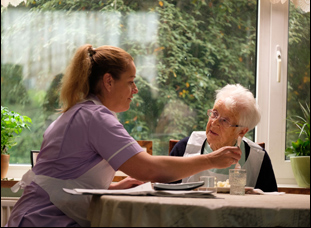
There could have been many other different types of jobs, but how we care for our older people is a real crisis in the UK, and I think around the world now, and it’s a job that’s greatly underestimated — how to deal with people with dementia, how to work with the medicine, how to deal with them, and the pressure they’re under is incredible because of the cutbacks and austerity. Certainly in the UK, people are having to make 15-minute visits and [the caregivers are] not getting paid for travel in between times. We just thought it was totally ironic that this mother [Abbie], who such a brilliant [caregiver], was looking after other people but didn’t have time to stay and to spend with her own children, and that contradiction was something that’s happening all over the world.
What’s wonderful about the structure of this is how you’re able to see the larger culture outside of this family through the visits they make to the people they serve. Was that an exciting prospect in terms of allowing the outside world in?
It’s always lovely when you capture people’s accents and get some sense of ordinary life, so the people that you meet – the people who are ill, the young lad that was disabled, the older man who was embarrassed, and the scene when [Abbie’s] in the bus stop and she’s just cleaned up someone who was all covered in feces, these are the stories you hear from [caregivers] and it was also a way of introducing the audience to the community, because how Abby treated those people was very different from how the community treated [Ricky as] the driver who just comes with a parcel. All they want to do is have it signed [for], and they don’t really ask any questions about the driver, so it was a nice contrast there that we thought would be interesting.
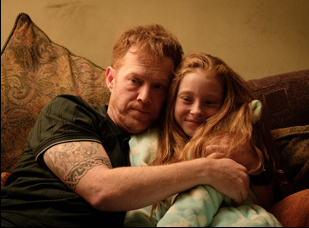
Because Ken and myself have been working for so long that we collaborate the whole way through. Right from the very beginning, because we’re also close friends, we’re always talking and swapping ideas. With this particular case, I was fascinated by these new contracts and the teams of psychologists and lawyers who write these things. And oftentimes, I may see some people who could be in the film when I’m doing the research and we work very closely with our good friend, Kathleen Crawford, who was our casting director, and we do the casting together. Sometimes what happens is just in the process of seeing different people, it gives you a dozen options. For example, Kris [Hitchen, who plays Ricky] in this film, he’s not actually from Newcastle, he’s from Manchester, but we just changed the backstory to suit Kris who came from Manchester. To people in the UK, you can tell the difference between a Newcastle accent and a Manchester accent and getting all these things right is very important for us.
And you have someone tease him for being a Manchester U fan when “nobody from Manchester can actually be a fan of theirs” – you couldn’t resist having some soccer in there, huh?
Well, we had to get a football in there. [laughs] Dave [Turner], who plays the Newcastle fan [Ricky makes a delivery to], he’s actually a farmer, and he’s in the farmer’s union. He was also in “I, Daniel Blake,” and he’s a lovely man. But you need kind of little moments of humor to punctuate the darkness, and Dave was a lot of fun, and he’s a Newcastle fan, and Kris is actually that Manchester United fan, so we had some mischief with that and we also had a wonderful film a long time ago with Eric Cantona, the great player from Manchester United, ”Looking for Eric,” which is why really felt we would just have a little reference to the King Eric from the past.
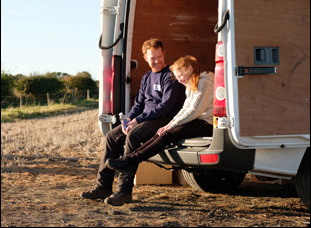
Oh, yes, because in “Daniel Blake,” I spoke to people inside the department of working pensions and to the trade union, and people who were fired, but with this one, especially with the drivers, it was much more difficult because the drivers are very vulnerable. They can be fired [where] they just don’t give them more work. It was so hard to get contact with them that I used to just go into the car parks where they were and I would talk to drivers as they finished shifts or started their working shifts. I persuaded several of them to let me come and do the job with them, but we organized in a way that wouldn’t put them in any jeopardy. I was picked up out of sight from the warehouse and then I spent the day with them [which] was how I really could see the relentless pressure from the scanner, how they’d have to deliver out of order, and [there was] no time for eating proper meals, [and you’d see] all these high-energy drinks that they have and the photographs of their children on the dashboards, and what their faces looked like at the end of driving for 12 hours. It was really by spending time with them, and listening to them that you realize that for many of them it was a massively pressurized job.
All the detail I got from people who are working as drivers or people [from] trade unions who are trying to organize them, but I got some great stories. I had the story of someone who had a broken foot, and he still had to drive because they get fined if they couldn’t find a replacement driver, and to find a replacement driver is a fairly difficult process, because [it has to be] someone who would know the route and to do [the job] quickly, [which] seems easy, but it’s actually very difficult. I also heard terrible stories of people who are very, very ill and who put their health in jeopardy because they couldn’t get a replacement driver. We have the story of a lovely man down south in England, and he missed a few appointments with his doctor because he [busy] was getting funds, then eventually got more and more sick, and on the 4th of January two years ago, he died of complications with diabetes in the age of 32. Everybody knew he was getting ill. They could see he was falling apart. But he was like a mouse in a wheel and just couldn’t break free from it. You saw some terrible tragedies and some cases that are much worse.
From what I understand, this has been able to start a real conversation in England about these issues, as your films tend to do. Is that gratifying?
We’ve been very very lucky with our brilliant distributors because with “I, Daniel Blake,” they organized 600 community screenings, meaning organizations like trade unions, university students or grassroots organizations, they’d [rent out] a whole church or a library and they’d show the film, and then there’s great debates afterwards. In fact, when I go back to Glasgow next Friday, they’re organizing a screening [of “Sorry We Missed You”] with 500 activists and community organizations, so they’ll watch the film, and they’ll organize, and try and understand what’s going on. To see a film used like that [where] it’s not just academic and it’s not just whimsical, but you see people actually trying to figure out and actually change things is massively gratifying. And you meet fantastic people because you talk to about these drivers that feel so isolated, so by themselves, and it’s very hard to organize them [as a union] because they’re so vulnerable, but then you see community groups trying to organize, it always gives you a big kick.
They [also] did a beautiful screening [the other] night here in New York with Danny Glover, who did the question and answer with us and he was really gobsmacked by the film. He spoke so eloquently about it because his parents were post office workers and he was telling us about his mom and dad, and his grandmother down in Georgia. He was such a thoughtful, generous man and it was a treat to share it with him.
“Sorry We Missed You” opens in New York at Film Forum on March 4th, Los Angeles on March 6th at the NuArt Theater and Montgomery, Alabama at the Capri. A full schedule of cities and dates is here.




